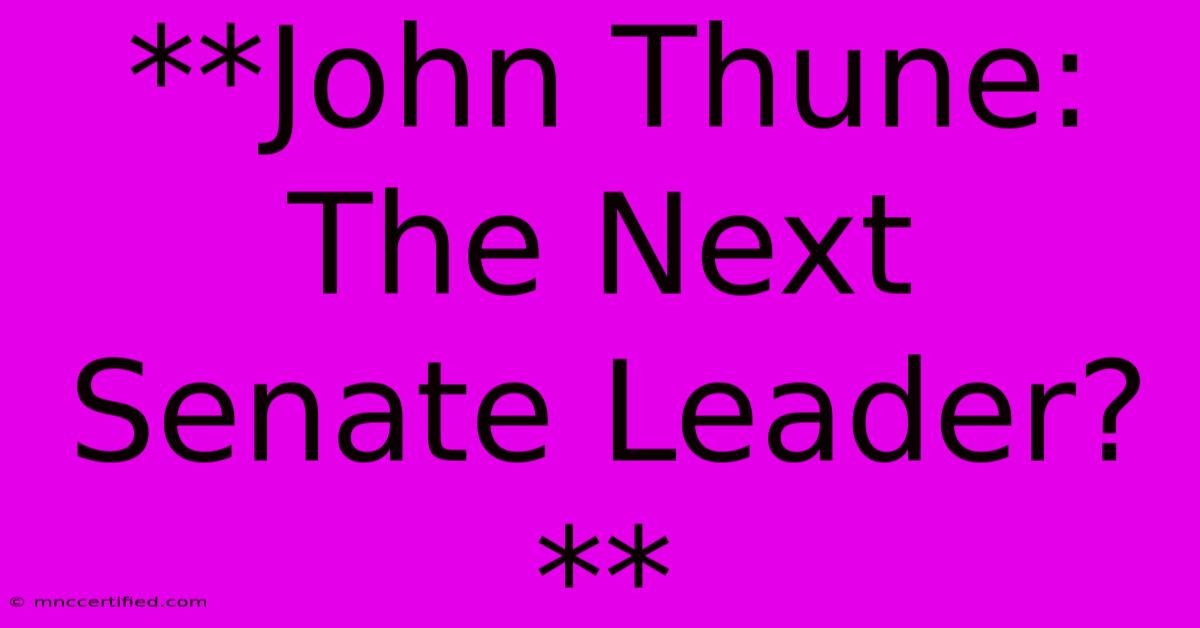**John Thune: The Next Senate Leader?**

Table of Contents
John Thune: The Next Senate Leader?
John Thune, the senior senator from South Dakota, is a prominent figure in the Republican Party and a potential successor to Mitch McConnell as Senate leader. While he has not publicly declared his candidacy, his growing influence and strategic maneuvering have fueled speculation about his ambitions. This article delves into Thune's political journey, his strengths and weaknesses, and the factors that could influence his potential rise to the top.
A Familiar Face in Washington
Thune, born in Murdo, South Dakota, entered politics in the 1990s, serving in the state legislature before winning a seat in the U.S. House of Representatives in 1996. After a brief stint as the House Republican Conference chairman, he successfully challenged the incumbent Democratic senator, Tom Daschle, in 2004.
Since then, Thune has steadily climbed the ranks of the Republican Party, becoming a powerful voice on issues like energy, agriculture, and telecommunications. His seniority and experience have earned him respect within the party, positioning him as a potential contender for the Senate leadership.
Thune's Strengths and Weaknesses
Strengths:
- Conservative Credentials: Thune's consistently conservative voting record aligns with the current Republican base, making him a popular choice among party members.
- Fundraising Prowess: His ability to raise substantial campaign funds has proven instrumental in his electoral victories and demonstrates his political acumen.
- Policy Expertise: Thune possesses a deep understanding of key Senate issues, particularly those related to the economy and energy. This expertise could prove valuable in negotiating legislation and navigating complex policy debates.
- Good Relationships: He has built strong relationships with colleagues across the political spectrum, potentially easing his path to leadership.
Weaknesses:
- Lack of Public Profile: Despite his political experience, Thune remains relatively unknown outside his home state. This limited public profile could hinder his chances of garnering widespread support.
- Potential for Conflict: While he enjoys good relations with many senators, his potential leadership could face challenges due to internal party divisions and ideological clashes.
- McConnell's Shadow: McConnell's long tenure as Senate leader casts a long shadow, and Thune may struggle to break free from his predecessor's influence.
Factors to Consider
The race for Senate leadership is a complex one, influenced by a variety of factors:
- McConnell's Tenure: McConnell's health and political ambitions will heavily influence the timing of any leadership transition.
- Party Dynamics: The balance of power within the Republican Party and the outcome of the 2024 elections will play a significant role in shaping the leadership contest.
- Potential Challengers: Other ambitious senators, such as Ted Cruz or Tim Scott, could emerge as potential candidates for the leadership position.
Conclusion
John Thune is a serious contender for the Senate leadership position. His conservative credentials, political experience, and fundraising prowess make him a formidable candidate. However, he faces challenges, including a relatively low public profile and the need to navigate internal party divisions. The outcome of the race will depend on a complex interplay of political factors and individual ambitions. Only time will tell if Thune will ultimately rise to the top of the Senate Republican hierarchy.
Keywords: John Thune, Senate Leader, Republican Party, Mitch McConnell, South Dakota, politics, leadership, Congress, Senate, Republican, Conservative, policy, election, campaign, fundraising, strategy, political maneuvering, influence.

Thank you for visiting our website wich cover about **John Thune: The Next Senate Leader?** . We hope the information provided has been useful to you. Feel free to contact us if you have any questions or need further assistance. See you next time and dont miss to bookmark.
Featured Posts
-
Actor Timothy West Passes Away East Enders And Corrie
Nov 14, 2024
-
Free Krispy Kreme Doughnuts Today World
Nov 14, 2024
-
Columbia Financial Investment Group
Nov 14, 2024
-
Krispy Kreme Doughnut Giveaway
Nov 14, 2024
-
Filetype Pdf Day Trading Cheatsheet
Nov 14, 2024